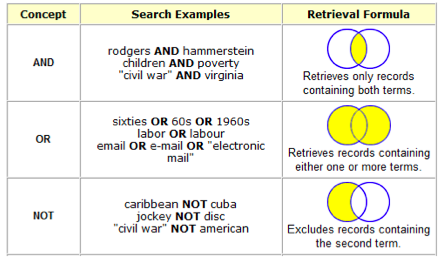

#Google boolean search tersm how to
A great Boolean search requires knowing the right keywords to use and then how to separate them out with the operators.īoolean methods can be used on any search engine: Google, LinkedIn, or even Facebook.īoolean is a term used to define the process of combining keywords with words called “operators.” These operators tell the search engine how to use the keywords in the search.

Your brain naturally works this way, probably also using the terms in a Boolean search.įor example, “ I want a candidate with experience in design AND management but NOT graphic design.” However, there are a couple of tricks that can exponentially improve the results a search returns.
#Google boolean search tersm series
The word Boolean comes from the inventor of the method, George Boole, who proposed that most outcomes could be arrived at through a series of logical choices. Effectively using Boolean search and knowing how to navigate Google can separate finding good talent from being lost and floundering in the midst of search engine results. While using keywords to find the right person seems straightforward, the reality is quite different. You have the opportunity to discover – literally – almost anyone, anywhere simply by typing. On the other side of typing the right words into a box on a screen is that rare undiscovered talent: the purple squirrel or four near-perfect candidates. In most cases, how you search massively influences the results you get. Searching Google can be a bit intimidating sometimes, however. But skipping the power of the top search engine when you’re looking for candidates would be a big mistake. We’re not saying you should use this instead of LinkedIn, GitHub, or a good recruiter. The flip side of this is that companies can (and should!) also use Google do the detective work to find top talent. If you’ve read some of our “ think like an online marketer” series recently, you might have noticed that we encourage companies to use marketing SEO and SEM tactics to attract candidates to their job postings and ads. Putting "double quotes" around a phrase will retrieve ONLY that exact phrase – without variation.Improve Your Company Branding With Zippia ("comprehensive claims" OR "land claims") AND (indian OR native OR "first nations" OR indigenous) It's also possible to search for multiple synonyms using round backets and the OR operator. As a basic rule – always use ( )’s to combine words linked together with OR. It looks for all records that contain either of these words, then finds which of these also contain the term "land claims".


The brackets tell the computer that "Indian" and "Native" both represent the same concept. Think back to doing math equations in school – the brackets work the same way in a database. Using round brackets ( ) in a search statement tells the system the order in which to perform the search. To do this, enclose the terms connected with OR within parentheses. It is possible to perform complex Boolean searches in which more than one Boolean Operator is used. This should be done cautiously, because as well as deleting the unwanted items, such a search will also eliminate records that discuss both the relevant topic as well as the unrelated topic. If you are retrieving many records that are unrelated to your topic, try using the NOT operator to eliminate a word. NOT is used to exclude a particular word or combination of words from your search results. If you are retrieving too many records, try adding another search term with the Boolean Operator AND. This search query would return a much smaller set of records, and the items found would be more specific to your research question. If you are retrieving too few records, broaden your search by adding a synonym with the Boolean Operator OR.ĪND is used to join words or phrases when both (or all) the terms must appear in the items you retrieve. The OR operator is particularly useful when you are unsure of the words used to categorize your topic or if information on your topic is even available. OR is used to join synonymous or related terms, and instructs the search tool to retrieve any record that contains either (or both) of the terms, thus broadening your search results. There are three common Boolean operators: AND, OR, NOT (it's best to capitalize Boolean operators because some search tools require it).


 0 kommentar(er)
0 kommentar(er)
